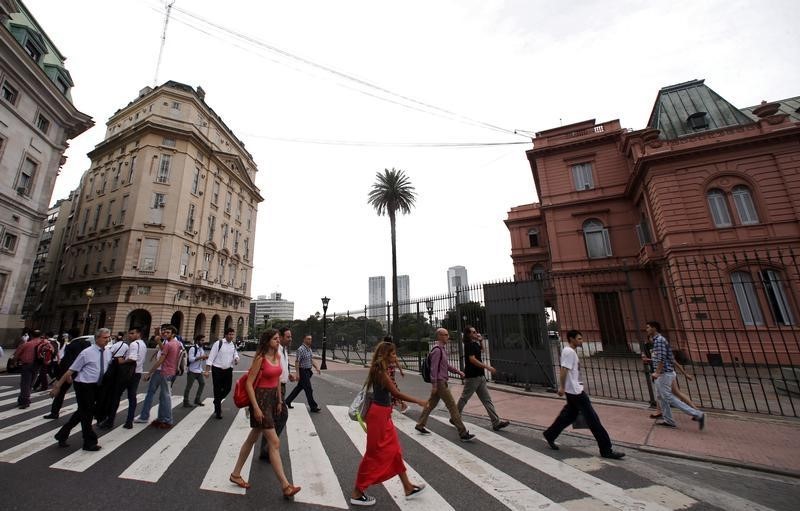(Bloomberg Opinion) -- As Argentines head to the polls for primary elections this Sunday, here’s a puzzler for voters: How to choose between political campaigns that demonize one another as ruin incarnate, but whose candidates have raced to claim the middle ground?
To hear it from officialdom, incumbent President Mauricio Macri of the Let’s Change Party is the country’s backstop against a return to the authoritarian populism that would convert South America’s second biggest economy into a Venezuela on the River Plate. And yet to his opponents, Alberto Fernandez and Cristina Fernandez de Kirchner, from the iconic Peronist “Front for All” party, Macri is the tool of avaricious neoliberals whose cold-blooded austerity will strangle the economy and soak the poor.
Much of this is political theater to juice the party faithful ahead of the election in October. (Sunday’s primary is more like a nationwide straw poll.) Strip away the histrionics, however, and what remains is a fight between the two most competitive of Argentina’s 10 presidential contenders to stake out the same, narrow policy space and poach moderate votes from the center. The convergence between the candidates is more than a matter of political style. It also shows how Argentina electorate has changed for the better, as crisis-battered voters demand plans and proposals not moonbeams.
Alberto Fernandez, a moderate and conciliator who heads the opposition Front for All ticket, cuts a sharp contrast with his running mate Cristina Fernandez – known to all simply as Cristina – an alpha Peronist whose eight years of wealth-destroying populism crippled the economy and alienated millions of Argentines. Macri, too, has bent backward to rebrand his struggling campaign, choosing as his running mate Miguel Angel Pichetto, a Peronist legislative power broker, in a clear gesture to estranged moderates.
Nor is there much daylight between their political positions. If Macri is vilified for his business-friendly reforms, austerity and a pact with the International Monetary Fund, then what to say of Fernandez, a pragmatist, who quit his post as Cristina’s chief of staff over her abrasive style, statist policies and fights with industrial leaders and the national media? As president, Cristina frequently bashed Argentina’s powerful farmers. Fernandez has courted them, proposing to cut taxes on agriculture exports if the economy grows.
The convergence makes sense in a country where political dissonance has only worsened chronic economic misfortune. The economy is in recession, unemployment hit a 13-year high and inflation has surpassed 50%. Sure, the U.S.-China trade war could give Argentina’s farmers a momentary bump. Yet global turmoil puts added pressure on the volatile peso, already the emerging market’s weakest currency.
Even as analysts say the economy is responding to reforms, sacrifice is widespread. More than a third of urban Argentines are poor and nearly half of children live on less than they need, a Catholic University of Argentina survey reported in June. In greater Buenos Aires, home to 28% of the national electorate, one in two households live in poverty. An urban crime wave and recrudescent corruption complete the kind of dismal tableau that creates an opening for populists.
Argentine populism is hardly dead, just attenuated, as the campaign’s turn to Peronism illustrates. “The Peronist brand is everywhere, but it’s populism lite,” said Argentine historian Federico Finchelstein, who teaches at the New School for Social Research. Peronism, after all, conveniently spans the political spectrum. This formfitting movement suits a society still enamored of personality politics but—perhaps because memories of dictatorship are still vivid—uneasy with the raging ideologies of the day. “No one from the Argentine right would dream of praising the dirty war or torture,” said Finchelstein, referring to the bilious mantras of Brazil’s populist President Jair Bolsonaro. “Remember Juan Peron described himself as the vegetarian lion.”
The campaigns have made a nod to that tradition. Macri can no longer run with the anti-politician mantle he wore in 2015, nor boast of his economic achievement, so he’s asking voters to have faith his reforms will eventually deliver results. Fernandez cannot promise a return to good times—Cristina’s government left Argentina prostrate—only an end to misery. “Both candidates are essentially saying ‘Believe in me’. That’s a populist framework not a platform,” said Finchelstein.
Attenuated populism won’t revive growth or drive reform. But hard knocks may help. Whoever is elected in October will have to negotiate more lenient terms (a smaller primary surplus) with the IMF and honor payments to creditors, according to Oxford Economics.
“Even if Fernandez and Fernandez win, indications are they won’t repeat Cristina’s last mandate. Investors and creditors will be swift to punish any return to populism,” said Goldman Sachs (NYSE:GS) emerging market analyst Alberto Ramos. Such is the civilizing effect or straightjacket—pick your party line—global markets impose upon policymakers, regardless of ideology. Argentina’s political hopefuls ignore that at their peril.
